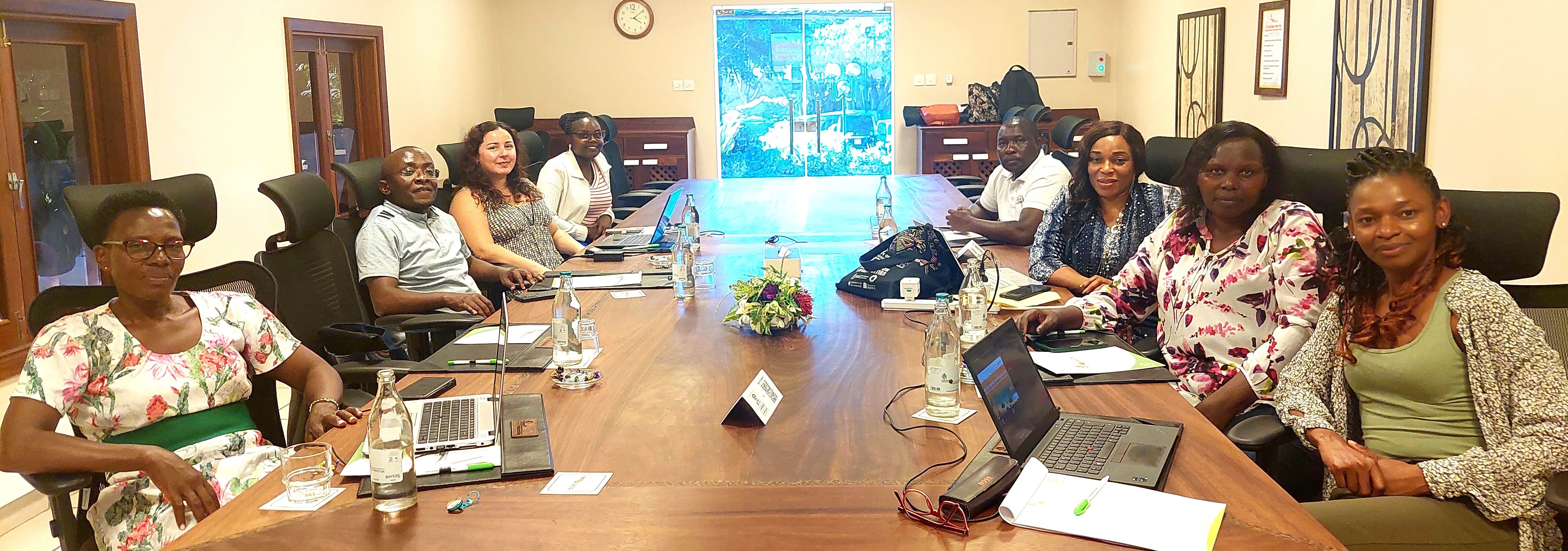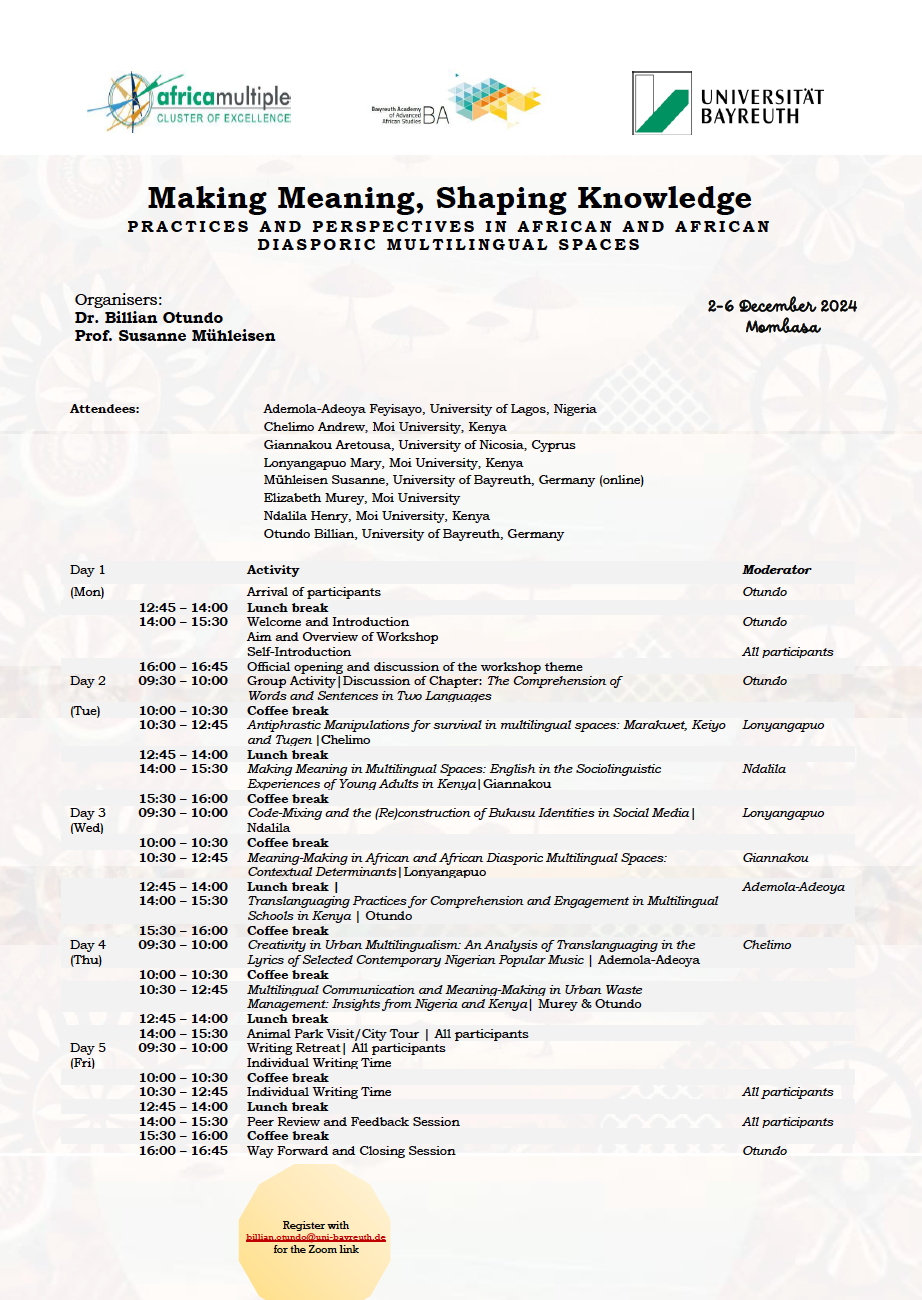Workshop: Making Meaning, Shaping Knowledge: Practices and Perspectives in African and African Diasporic Multilingual Spaces
Date: December 2, 2024 – December 6, 2024
Location: Mombasa, Kenya
Workshop Organizers:
Dr. Billian Otundo
Prof. Susanne Mühleisen
The workshop titled "Making Meaning, Shaping Knowledge: Practices and Perspectives in African and African Diasporic Multilingual Spaces" was designed to bring together scholars researching countries on 3 continents - Kenya, Nigeria, Greece, Germany, and Jamaica - to explore the intricate relationship between language, thought, and culture in multilingual African and African diasporic contexts. Central to this workshop was the understanding that speaking and thinking are deeply interconnected, as emphasized by Vygotsky’s assertion that “the relation of thought to word is not a thing but a process, a continual movement back and forth from thought to word” (Vygotsky, 1986, p. 218).
Over the five-day event, scholars from various academic and cultural backgrounds engaged in discussions on the complex dynamics between language, thought, and culture, with a particular focus on multilingual speakers in African and diasporic spaces. The sessions centred on how thinking and speech are intertwined in the process of “making meaning and shaping knowledge and experience through language” (Swain, 2006, p. 98), particularly among multilingual speakers in these communities.
The workshop also delved into Translanguaging Theory (Garcia & Wei, 2014), which examines how multilingual speakers creatively navigate language practices beyond traditional language boundaries. Practices such as code-switching, code-mixing, code-meshing, translation, modelling, repetition, and use of images and sketches, among others were explored as tools for constructing and negotiating meaning in multilingual and multicultural settings.
The discussions were framed around two key questions:
1. How do linguistic nuances impact cognition and meaning-making, particularly among multilingual speakers in African language contexts? This question sought to explore how language influences thought processes and knowledge construction in diverse linguistic environments.
2. To what extent does translanguaging contribute to meaning-making and challenge traditional notions of language boundaries among multilingual individuals? This question examined how multilingual individuals navigate meaning across different languages through various translanguaging practices.
The goal of the workshop was to deepen participants' understanding of multilingual cognition and offer practical strategies for fostering inclusive communication and knowledge construction in multilingual contexts. An anticipated outcome of the workshop is the publication of an edited volume. Throughout the event, participants were encouraged to present drafts of their chapters, engage in discussions to refine them and participate in a two-day writing retreat.
The following chapters, which emerged after the presentations and writing retreat, provide unique perspectives on the role of translanguaging and multilingualism in shaping meaning, identity, and communication in diverse African and diasporic contexts. These contributions highlight the complexity of language use in both educational and social spaces:
.
- Prof. Dr. Mary Lonyangapuo: "Meaning-Making in African Multilingual Spaces: Contextual Determinants" Prof. Lonyangapuo’s study critically examines how translanguaging and context influence meaning-making in Kenyan multilingual spaces. By integrating sociolinguistics, cognitive linguistics, and education, the paper explores how multilinguals in various sociocultural contexts employ translanguaging for communication. The findings stress the importance of context and translanguaging for effective meaning-making, emphasizing the need for multilingual spaces that allow for diverse linguistic repertoires in knowledge construction within African societies.
- Dr. Feyi Ademola-Adeoye: "Creativity in Urban Multilingualism: Translanguaging in the Lyrics of Selected Contemporary Nigerian Popular Music" Dr. Ademola-Adeoye’s paper examines how Nigerian musicians use translanguaging in their lyrics to express emotions, cultural identity, and meaning. Through a qualitative analysis of ten artists’ lyrics, the paper demonstrates how code-switching, lexical innovation, and indigenous proverbs in Nigerian music convey complex meanings and foster inclusivity. Translanguaging serves as a creative tool for negotiating identities and expressing cultural pride in a multilingual society.
- Dr. Billian Otundo: "Translanguaging Practices for Meaning-Making and Engagement in Multilingual Primary Schools in Rural Kenya" Dr. Otundo investigates how translanguaging practices support meaning-making, comprehension, and engagement in rural primary schools in Kenya’s Bungoma and Nandi counties. The study highlights the role of translanguaging, such as code-switching, sketching, and modelling, in fostering classroom interaction and enhancing student understanding. The research reveals that translanguaging is an essential pedagogical tool in multilingual educational settings, enabling learners to connect more effectively with content.
- Henry Ndalila: "Codeswitching and the (Re)Construction of Bukusu Identities on Facebook" Ndalila’s research explores how codeswitching among Lubukusu, Kiswahili, and English on Facebook contributes to the (re)construction of Bukusu identities. Using virtual ethnography, the study investigates how Facebook users manipulate language to express ethnic identity and highlight cultural practices, such as circumcision and burial traditions. The study provides insights into how codeswitching on social media helps redefine and negotiate identity in digital spaces.
- Dr. Aretousa Giannakou and Ellie Zampiaki: "English in the Sociolinguistic Experiences of Young Adults in Kenya: Exploring Practices, Experiences, and Perceptions" Giannakou and Zampiaki explore the role of English in shaping the linguistic practices, cognitive processes, and identities of young adults in Kenya’s higher education system. Based on surveys of Kenyan university students, the paper examines the influence of English on language prestige, creativity, and the acceptance of translanguaging practices. The findings highlight English’s enabling role in fostering diversity while also potentially influencing the status of local languages in Kenya’s multilingual context.
- Andrew Chelimo: "Translanguaging Practices for Survival in Kenyan Multilingual Spaces: Meaning-Making in Marakwet, Keiyo, and Tugen Linguistic Communities" Chelimo investigates how speakers of Marakwet, Keiyo, and Tugen languages use translanguaging to navigate social and economic challenges. Using Conceptual Metaphor Theory, the study explores how translanguaging allows speakers to manipulate metaphors and metonyms to address complex socio-economic realities. The research highlights how translanguaging aids in meaning-making, helping these communities cope with socio-political and existential struggles.
- Dr. Elizabeth Murey and Dr. Billian Otundo: "Multilingual Communication and Meaning-Making in Urban Waste Management: Insights from Nigeria and Kenya" Murey and Otundo’s study examines the role of multilingualism and translanguaging in urban waste management in Nigeria and Kenya. By analyzing communication strategies in Lagos and Eldoret, the research underscores the importance of culturally relevant messaging and language diversity in promoting sustainable waste management practices. The findings recommend leveraging local languages, translanguaging, and mobile platforms to improve public understanding and engagement with waste management policies.
Contact Person: Dr. Billian Otundo billian.otundo@uni-bayreuth.de
References:
- Garcia, Ofelia, and Li Wei. Translanguaging: Language, Bilingualism and Education. Basingstoke: Palgrave Macmillan, 2014.
- Vygotsky, Lev S. Thought and Language. 2nd ed. Cambridge, MA: MIT Press, 1986.
- Swain, Merrill. "The Output Hypothesis: A Response to Fischer." Applied Linguistics 27, no. 1 (2006): 98-112.



